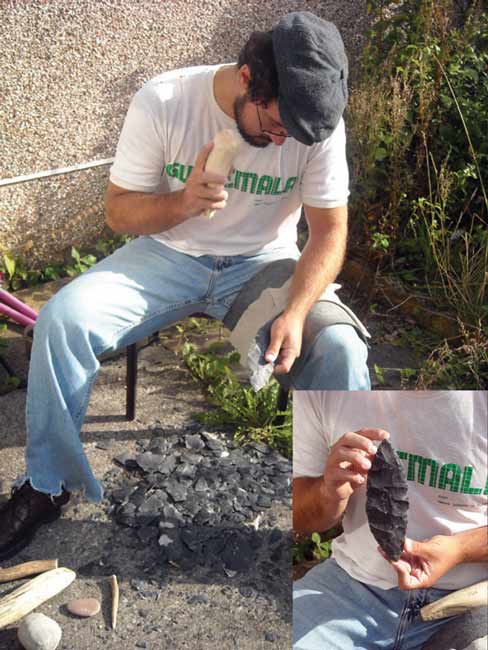Rare find alters origins and distribution of Terminonaris; first home was Texas and North America — not Europe
http://www.youtube.com/watch?v=oHS6vE4o3XY
Making its first appearance in Texas, a prehistoric crocodile thought to have originated in Europe now appears to have been a native of the Lone Star State.
The switch in origins for the genus known as Terminonaris is based on the identification of a well-preserved, narrow fossil snout that was discovered along the shoreline of a lake near Dallas.
The 96-million-year-old fossil from Texas is the oldest prehistoric crocodile of its kind in the world, according to paleontologist Thomas L. Adams at Southern Methodist University, Dallas, who identified the reptile.
A distant cousin of modern crocodiles and alligators, Terminonaris was similar to the modern-day Indian gharial, only much larger.
“With the recognition of Terminonaris here in Texas, this actually changes a lot about what we thought we knew about this group,” Adams said.
“Now we know the group had a wider distribution range, and that it’s much older. It represents a unique find for Texas. This is the first occurrence of Terminonaris in Texas. It’s also the oldest occurrence of Terminonaris in the world, and it’s also the southernmost occurrence of Terminonaris anywhere.”
There are six other known Terminonaris fossil specimens: five from North America and one from Europe. The European specimen, from Germany, previously was thought to be the oldest. Scientists had concluded that Terminonaris originated in Europe and then traversed the Atlantic and dispersed throughout North America.
“Now we know Terminonaris most likely originated here in Texas and dispersed northward,” said Adams, a doctoral candidate in SMU’s Roy M. Huffington Department of Earth Sciences at SMU.
Big Texas crocodile swam the shores of North America’s prehistoric seaway
Adams identified the reptile primarily from its long snout, which measures more than 2 feet long and 7 inches wide, or 62 centimeters. With a snout that long, Adams estimates the head would have been about one meter long.
Book a live interview
| To book a live or taped interview with Thomas Adams in the SMU News Broadcast Studio call News and Communications at 214-768-7650 or email news@smu.edu. |
Related Links
- Institute for the Study of Earth and Man
- Roy M. Huffington Department of Earth Sciences at SMU
- SMU’s Dedman College
More SMU Research news
“Based on Nile crocodiles and the Indian gharial, which are both large crocodiles, a regression analysis indicates this Terminonaris probably would have been 23 to 25 feet long,” said Adams. “The largest living crocodile today is the saltwater crocodile, which can reach up to 20 feet in length.”
The Texas Terminonaris was an adult and most likely weighed more than a ton, he said.
Adams identified the fossils in “First Occurrence of the Long-Snouted Crocodyliform Terminonaris (Pholidosauridae) from the Woodbine Formation (Cenomanian) of Texas” in the Journal of Vertebrate Paleontology.
Prehistoric crocodiles such as Terminonaris together with living crocodiles make up a large group called crocodyliformes. While technically there are differences between living crocodiles and each of the different types of fossil crocodile forms, all of them are often commonly referred to as crocodiles.
Today there are only 23 species of living crocodiles, a small number compared to the many species of mammals, birds, lizards, snakes and fish alive today, Adams said. That’s in stark contrast to prehistoric times.
“In the past, the crocodilian forms were very diverse and they were very successful. There were hundreds of species. Even at the time of the Texas Terminonaris, they were found everywhere,” Adams said.
Texas specimen fills gap, expands age and range of group
Texas Terminonaris was discovered by Dallas-area amateur fossil enthusiast Brian Condon, a rural mail carrier. Condon discovered the heavy pieces of the snout and a vertebrate in 2005 while fossil hunting near his home on Lake Lewisville, a 26,000-acre recreational and fishing lake managed by the U.S. Army Corps of Engineers. He spotted the first of the pieces along the shoreline. Condon donated the fossils to SMU’s Shuler Museum of Paleontology.
In prehistoric times, Texas Terminonaris would have made its home in a marine setting, along the eastern shore of North America’s vast prehistoric Western Interior Seaway. One hundred million years ago the seaway was a wide, shallow sea that split the North American continent in half from the Arctic to the Gulf of Mexico, said Adams, lead author on the scientific article. The seaway would have covered Lake Lewisville’s location.
In its day-to-day life on the seaway, Terminonaris would have kept close to shore, perhaps in a shallow lagoon or estuary, also venturing into the seaway’s warm salty water to hunt for fish. Like modern crocodiles and alligators, Terminonaris would have eaten whatever it could catch, Adams said. Its long, slender snout was well-suited for devouring fish, small mammals and even small dinosaurs.
North America’s other Terminonaris fossil specimens also were found along the seaway. A Kansas specimen is the youngest, about 91 million years, while those from Saskatchewan, Canada, and Montana are 93 million years old. The German specimen is 94 million years old.
“Terminonaris now here in Texas fills in a gap that we didn’t have information for,” Adams said. “It tells us that as a group, as a genus, they were around much longer, because we extend the age back to 96 million years. The range for them is now expanded, because this is the most southern occurrence of them.”
Well-preserved fossil offers no clues to adult reptile’s cause of death
While the Texas fossil is well-preserved, how the reptile died remains a mystery since only the snout was found.
It probably died in the water or washed out into the open sea, where it floated to the bottom and was buried very quickly, said Adams. The discovery of seven Terminonaris fossil specimens worldwide is significant, he said.
“To be fossilized, it requires they die at the right time in the right place, be buried very quickly, then eventually be exposed and uncovered,” he said. “So the odds of being fossilized and being found as a fossil are very slim.”
Condon found one piece at the water’s edge of Lake Lewisville. The other pieces were further up a bank that sloped toward the shore, Condon said. The pieces had been deposited on the ground by receding water, pulled from the Woodbine Formation by constant waves that had washed away a soil bank and uncovered the heavy fossils. The outcrop of the Woodbine Formation visible at Lake Lewisville starts at the Red River in North Texas and thins as it nears Dallas.
Condon, who had previously found other fossils in the area, initially thought the pieces were petrified wood.
“This piece looked like a loaf of bread from Subway. It was all wrinkled,” Condon said. “Then I picked it up and turned it over and saw it had teeth — big, round conical teeth — and I thought, ‘This is amazing. It’s a jaw.'”
Co-authors on the article were SMU paleontologists Michael J. Polcyn, Dale A. Winkler and Louis L. Jacobs, and also paleontologist Octavio Mateus, Universidade Nova de Lisboa, Portugal.
The research was funded by Southern Methodist University???s Institute for the Study of Earth & Man. — Margaret Allen
SMU is a nationally ranked private university in Dallas founded 100 years ago. Today, SMU enrolls nearly 11,000 students who benefit from the academic opportunities and international reach of seven degree-granting schools. For more information see www.smu.edu.
SMU has an uplink facility located on campus for live TV, radio, or online interviews. To speak with an SMU expert or book an SMU guest in the studio, call SMU News & Communications at 214-768-7650.

 Human diabetes has new research tool: Overfed fruit flies that develop insulin resistance
Human diabetes has new research tool: Overfed fruit flies that develop insulin resistance









 Middle school boys who are reluctant readers value reading more after using e-readers
Middle school boys who are reluctant readers value reading more after using e-readers
